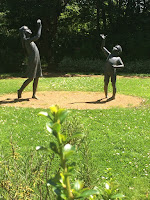I never thought I'd end up preaching a sermon on Pokémon! However, if part of what we are called to do is describe the things of the world and make connections to with the challenge of the Gospel, then the question of 'augmented reality' merits consideration.
According to the Surrey Advertiser, Guildford has been invaded: by Pokémon.
Stag Hill is fruitful territory for those collecting Zubats, Drowzees, Raticates, Spearows and even a Meowth.
If this makes no sense, let me take a step back. Pokémon Go is a mobile app - an updated version of a video game which was popular in the 1990s (which passed me by at at the time). The aim is to seek out, catch and train animated creatures - whose names echo their real world equivalents.
 So far, so unremarkable you might think; but as an augmented reality game, Pokémon Go enables players to interact within and between virtual and real worlds.
So far, so unremarkable you might think; but as an augmented reality game, Pokémon Go enables players to interact within and between virtual and real worlds. Dotted across our town are Pokéstops where you can collect items needed to play the game. There are five within the cathedral precincts! All around us there are virtual fluttering leaves, indicating the proximity of Pokémon.
People of all ages are going on walks; discovering new landmarks; becoming tourists in their own neighbourhoods. If you see groups gathering gazing at their phones, flicking seemingly invisible objects, perhaps you've come across a Pokémon Gym where characters can compete and test their strength.
In the cathedral office, on the university campus, at the station, in the supermarket car park, along the river, outside the Friary Centre... commuters, teenagers, lay clerks, shoppers and even a Canon can be spotted building their collections.
So, whether you're an active participant or not, we can't help noticing that it is having an impact on our public landscape. It's an individual pursuit; but it generates informal gatherings, People literally congregate - attracted by animation breaking into reality.
It's no accident that the launch was timed with the end of term. It might seem trivial, but I wonder what else is going on.
Is there a longing for playfulness amidst the bewilderment of political upheaval? There's something nostalgic as well as innovative, a harking back to childhood. Is it good that people of all ages are exploring their local neighbourhoods on foot? Yet it's also disconcerting that this is in done whilst inhabiting a parallel universe, cut off from reality
On Friday evening, there were more people in and around the cathedral seeking out Pokémon than there were watching our glorious peregrine falcons. How do we communicate that this place is more than just a Pokéstop but somewhere of welcome, beauty, inspiration and worship?
Today we recall that, like James the Apostle, we are to witness to the good news of Christ with joy and boldness; we are to draw people to the fire of God's love. As we come to terms with the allure of augmented reality, we are called to explore a life that is more real.
Life that is life. Life that is about experiencing every moment, every conversation, every task, every meal more deeply - as opportunities to glimpse something of God's grace, mercy, and love in the ordinary.
In a world of Pokémon, we see that human beings are entranced by something more; yet, we know such games will go out of fashion, leaving a void waiting to be filled with some other fad or activity. Perhaps this game has slowed down the pace of our experiences, encouraging us to wait patiently and pay attention to what's going on around us.
 Of course the paradox is that paying attention to the virtual world may mean we miss the real human need or possibility of encounter with God. How to enable people to walk into, rather than past, the children's garden - to take time to pause, reflect, rest and pray? Perhaps we hope that being there will arouse curiosity that it's a place which is more than just a Pokéstop.
Of course the paradox is that paying attention to the virtual world may mean we miss the real human need or possibility of encounter with God. How to enable people to walk into, rather than past, the children's garden - to take time to pause, reflect, rest and pray? Perhaps we hope that being there will arouse curiosity that it's a place which is more than just a Pokéstop. This is where the challenge of our texts cuts across the Pokémon phenomenon. Ultimately, it isn't life giving. However much fun it is, it's short-lived. It doesn't satisfy or transform; it's playful without generating kinship. It is a worldly false attraction, or in the words of our collect a 'worldly and carnal affection'.
James' life, work and context was by no means devoid of such claims on our attention either. He demonstrated a radical and single-minded devotion to walking with Jesus. He left his father, livelihood, friends, all that he had and all that was familiar. He walked the land with Jesus; he visited sacred sites. This was not augmented reality in the way that Pokémon is. It was augmented in the experience of the nearness of God's Kingdom in ordinary, full of love, life and hope.
James followed Jesus in some of the most intimate moments of his ministry - glimpsing glory, restored hope and renewed life. He was there when the crowd wanted to hear more and see more; when they sang hosanna and when they cried crucify. Called by name, he saw his Lord betrayed by a kiss; re-called by the power of the Spirit, he gave his life witnessing to Jesus' resurrection.
Perhaps James continued to reflect on the episode we heard tonight. Perhaps like him, we sense the desperate need and extraordinary hope of Jairus and an unnamed woman. One falls to his knees, begging repeatedly in public; he's articulate, determined and trusting. One reaches out to touch, wordlessly placing her trust in him; in her determined 'if only'.
One watched a precious child fade from health and vitality; one had endured alienation, pain and worsening health. And Jesus goes with the one; he turns towards the other. His power brings peace and healing, he publicly acknowledges her unspoken faith. His power cuts through wailing, weeping and mocking laughter. In a private, tender moment he restores a daughter's life; he doesn't court amazement, but simply instructs others that this 12 year old girl must eat.
Jesus met people where they were. Unlike the Pokémon player, he isn't capturing them with a triumphant 'Gotcha'. Rather he frees them - allowing the grace of God to work through the dignity of human agency. He makes them whole - and draws them into the Kingdom. This is the augmented reality we are called to inhabit.
For many, this place is just another Pokéstop: a place to pick up the items we need to seek out, attract, find and capture elusive virtual creatures. But it is more than that.
 For us, and for our world, this place is where we can learn what is real.
For us, and for our world, this place is where we can learn what is real. Where we can sink to our knees in longing and distress; where we're restored, forgiven healed; where we find new and deeper bonds of kinship; where we can learn to pray in words; where the Spirit sighs within us wordlessly; where we explore the creativity of solitude; where we can playfully and imaginatively be drawn into the good news; where that God was in Jesus Christ reconciling the world to himself.
Even now, his call on us to love is very near to us: on our lips and in our heart.
This is the augmented reality of which the book of Deuteronomy bears witness: love God, walk in his ways, choose life. We are to love, obey and hold fast to God's faithfulness. Choose life.
© Julie Gittoes 2016
The readings for the Eve of James the Apostle were: Deuteronomy 30: 11-end and Mark 5:21-end



